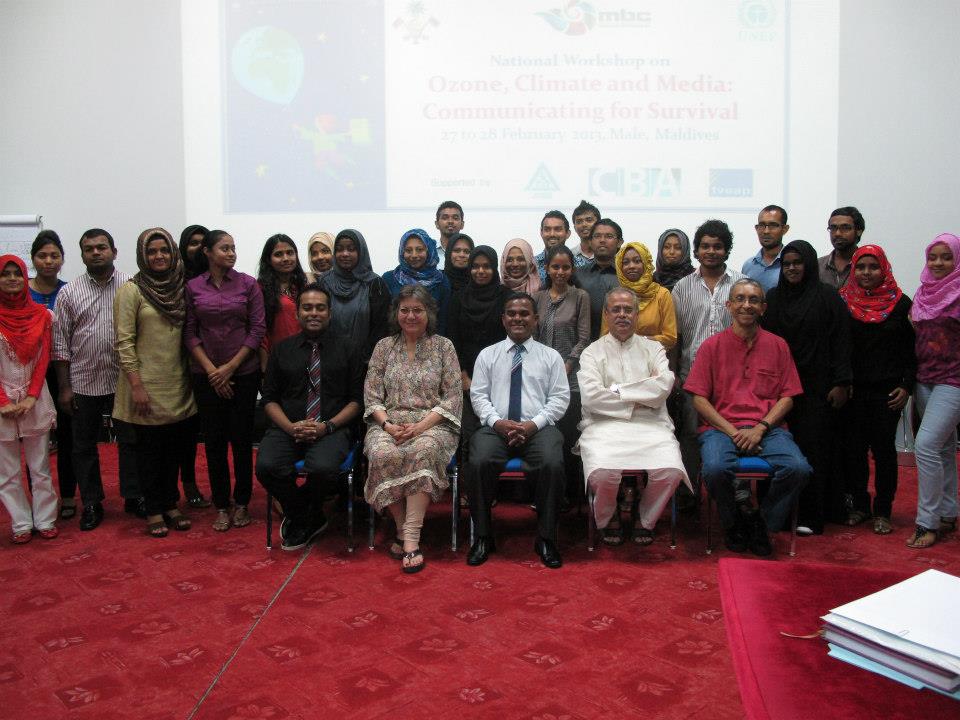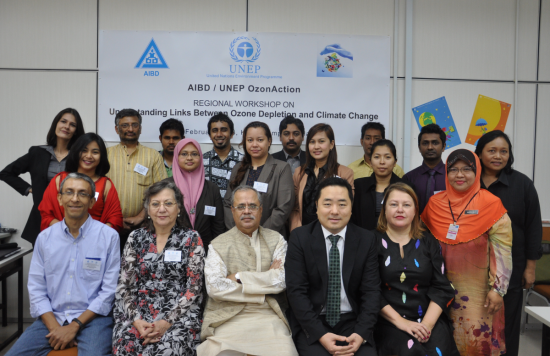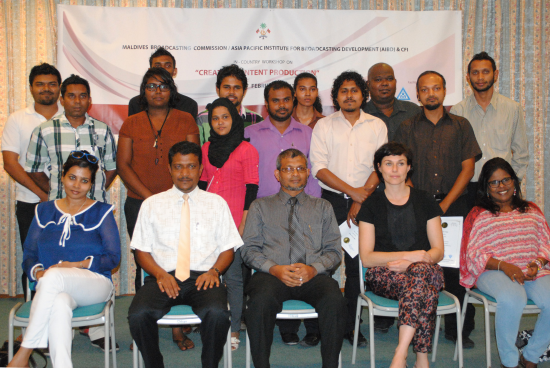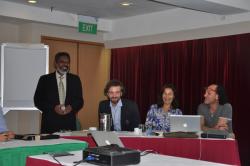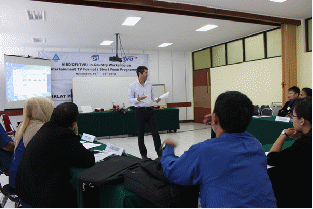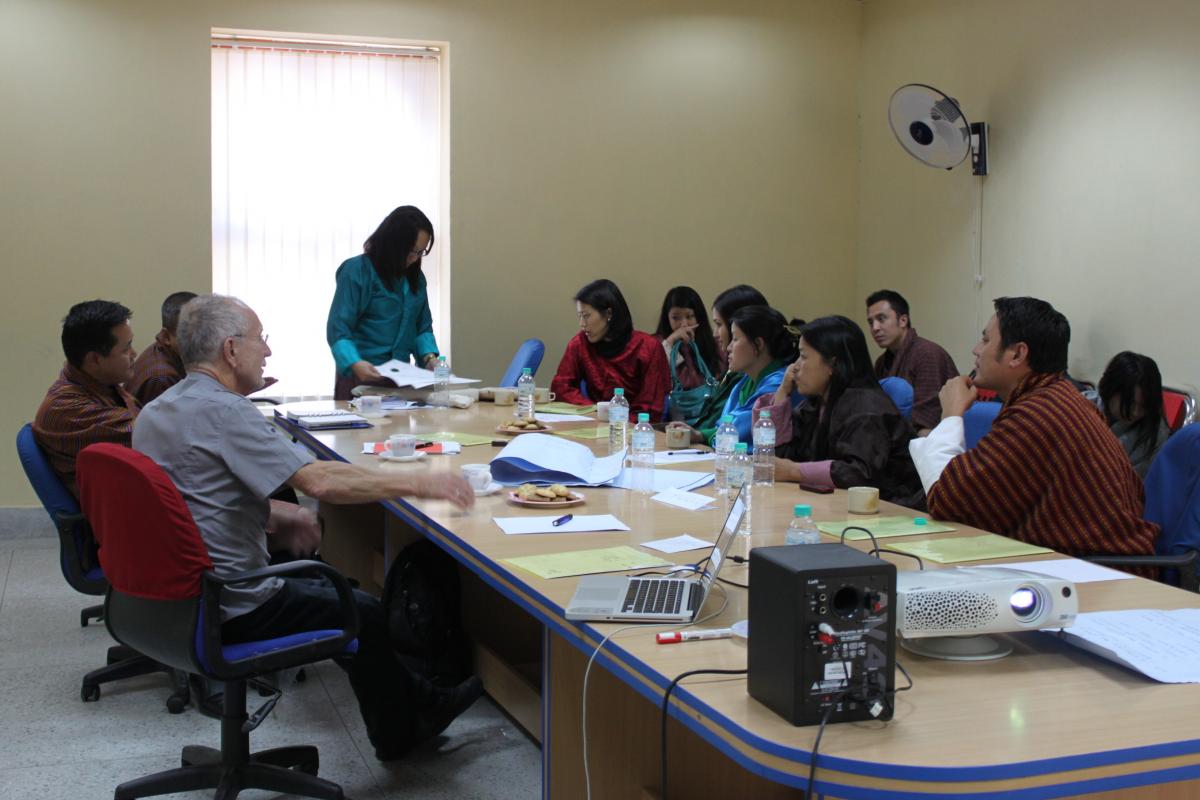The government of the Maldives plans to ban the import of HCFC-based equipment from 1 July 2014. Minister of State for Environment and Energy, Mr. Abdul Matheen Mohamed, announced this at the closing ceremony of a national media training workshop on ozone and climate held in Maldivian capital Malé on 28 February 2013.
The government of the Maldives plans to ban the import of HCFC-based equipment from 1 July 2014. Minister of State for Environment and Energy, Mr. Abdul Matheen Mohamed, announced this at the closing ceremony of a national media training workshop on ozone and climate held in Maldivian capital Malé on 28 February 2013.
The Minister emphasized the need to raise awareness among both consumers and industry about these regulations, and sought the media’s cooperation.
The workshop, titled ‘Ozone, Climate and Media: Communicating for Survival’ was held on 27 and 28 February 2013 at Sineco Radio Maalam, Voice of Maldives. It was attended by 22 journalists and broadcasters drawn from the country’s print, broadcast and web media.
The workshop was aimed at sensitizing the media about climate and energy efficiency benefits of HCFC phase-out for the industry and households in the Maldives. It was organized by the National Ozone Unit of the Ministry of Environment and Energy in partnership with UNEP OzonAction and Maldives Broadcasting Commission. It was supported by the Asia-Pacific Institute for Broadcasting Development (AIBD), Commonwealth Broadcasting Association (CBA), and TVE Asia Pacific.
On February 27, the workshop was inaugurated by Mr. Mohamed Shaheeb, President of Maldives Broadcasting Commission. He highlighted the importance of media’s role in educating and creating awareness among the public on environmental issues.

At the closing ceremony, Ms. Miruza Mohamed, the National Ozone Officer, announced a new media award for excellence in ozone/climate related media products carried in print, broadcast and web media in the Maldives. The USD 1,000 award is open to all Maldivian journalists and broadcasters working in Divehi and English.
The media training workshop was conducted by NOU staff along with two regional media experts, Mr Nalaka Gunawardene, Director of TVE Asia Pacific, and Ms Moneeza Hashmi, General Manager of HUM-TV of Pakistan and President, Commonwealth Broadcasting Association (CBA).
In 2009, the Maldives made a historic decision to phase out HCFCs by 2020, in line with its carbon neutrality policy, which is 10 years ahead of the Montreal Protocol phase out schedule.
Maldives engages Media for HCFC phase-out
The government of the Maldives plans to ban the import of HCFC-based equipment from 1 July 2014. Minister of State for Environment and Energy, Mr. Abdul Matheen Mohamed, announced this at the closing ceremony of a national media training workshop on ozone and climate held in Maldivian capital Malé on 28 February 2013.
Broadcasters Study Ozone and Climate Issues
A UNEP-AIBD workshop trains TV producers from the Asia-Pacific to spread awareness about ozone depletion and climate change. “Why don’t the greenhouse gases escape through the hole in the ozone layer?” asks an average TV viewer in a cartoon that first appeared in a US newspaper a few years ago. That question illustrates the confusion in the minds of many non-specialists across the world.
AIBD, UNEP OzonAction Regional Workshop on Understanding Links Between Ozone Depletion and Climate Change
The 3-day regional media workshop from 20-22 February 2013 in Kuala Lumpur, Malaysia engages a selected group of broadcast television professionals from the Asia Pacific region on the current status and challenges in ozone layer protection and its links to combating climate change.
AIBD/CFI/MBC In-country Workshop on Creative Content Production
The In-country workshop on creative content production organized by AIBD with the support of CFI was successfully held from 3 to 7 February 2013 in Male, Maldives. Maldives Broadcasting Commission (MBC) hosted the workshop.
AIBD / PRASAR BHARATHI Sub-Regional Workshop on Digital Radio Transmission
This international level workshop was conducted from 3 -11 Dec 2012 at the All India Radio-Staff Training Institute (Technical) complex in New Delhi. It was attended by 14 broadcast engineers and technical personnel from Bhutan, India, Malaysia, Maldives, Mozambique, Nepal, Nigeria and Thailand.
AIBD/VTV In-Country Workshop on HD Camera/Studio Lighting
The In-Country Workshop organized by AIBD for Vietnam Television (VTV) was held in Hanoi, Vietnam on 3-7 December 2012. The focus of the activity was to train VTV camera people on lighting techniques for HD cameras specific to indoor studio operations, in particular for news and game shows, and outdoor program production, in particular for news gathering and live events.
Entertainment & New Media: Enhancing the audience
The regional workshop organised by AIBD and supported by the French Government and Canal France International (CFI) was held in Singapore from 4 – 6 December 2012 and attended by 13 participants from eight countries.
AIBD/CFI/TVRI Entertainment TV Format Workshop
The Entertainment TV Format workshop held recently in Jakarta was focusing on how to develop creativity for TV production and how to be able to select qualified content for entertainment program.
AIBD/CFI/TVRI Entertainment TV Format Workshop
The Entertainment TV Format workshop held recently in Jakarta was focusing on how to develop creativity for TV production and how to be able to select qualified content for entertainment program.
This In-Country workshop was held at the TVRI Training Centre in Jakarta from 19 November to 23 November 2012. The workshop was organised by AIBD with a consultant from Canal France International (CFI).
AIBD/NRK/BBS In-Country Workshop on Children’s TV Programme
Bhutan TV - BBS is one of the youngest TV stations in the world, established in 1999. The number of TV channels in many places in Bhutan, are as in the rest of the world - a lot of international channels via cable and satellite.
For BBS, it is important to create their own programmes for children and youth, which takes care of Bhutanese culture and language.In addition, BBS focuses on parenting programme.
From 8 to 12 October, I had the pleasure of giving a workshop in Thimpu for 10 participants from the staff of BBS.


